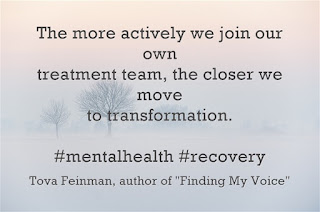“Often it's deepest pain which empowers you to grow into your higher self." -Karen Salmansohn
Dorit Sasson of Giving Voice to Your Courage reached out to me to learn more about the courage it took to write about the twenty-year patient-psychiatrist collaboration in my groundbreaking book Finding My Voice and the road towards recovery from disability to full-time employment. I'd love to know what you think of this post - feel free to share this post and post your comments below.
Thank you Dorit!
Dorit Sasson: First and foremost, let's start with your book "Finding My Voice." There's right now a lot of public awareness around the importance of telling one's story to help educate the public on mental illness. What kind of experience or work did you have to do to give the writing of this book justice?
Tova Feinman: Although this book details the severe mental illness and childhood trauma I suffer with, it is actually a story about the healing power of the clinical relationship between psychiatrist and patient.
It’s a relationship story about trust, bonding, faith, and the transformation that results when all these elements of healing work in concert. This book is less “my story” and more the common denominator in the story of clinically guided healing. What does make my journey unique is the fact that it’s not unique. This is what good psychiatric care looks like and how it succeeds.
Any patient who has found recovery in treatment could tell a similar story. Unfortunately, far too few do. I want to see more successful clinical journeys shared. There is no shortage of stories about illness. There is a dearth of stories about the mechanism by which illness becomes recovery.
DS: This book describes a twenty-year period of collaboration of healing between yourself as a mentally ill patient and Dr. Rosen. As an author, were you aware of how important it was for you to give voice to the healing part of this book? Do you think you achieved even deeper healing beyond the level of care, as an author?
 TF: Healing is an ongoing process. Certainly, the art of sifting through twenty-two years of mental health care to distill out essential events and facts fostered further growth. I made the comment to Dr. Rosen when I said, “I don’t write about what still hurts.”
TF: Healing is an ongoing process. Certainly, the art of sifting through twenty-two years of mental health care to distill out essential events and facts fostered further growth. I made the comment to Dr. Rosen when I said, “I don’t write about what still hurts.”
The ah-ha moment for me as I wrote this book happened when I realized just how much of my life and past no longer hurt. I truly am healing and this transformation could not have occurred without solid clinical care.
DS: How easy or hard was it for you to tell your story?
TF: Sifting through 22 years of clinical experiences to reach the key nuggets of detail wasn't difficult. Making the decision that those details should be made public was difficult. Losing the cloak of anonymity was even more difficult. Accepting that you are making yourself vulnerable to total strangers was the most difficult. However, if you have a message worth sharing, you take the risk.
DS: How is being a mental health patient different than telling your story? What ingredients do you need to make this experience successful?
TF: I am many things. I’m a mom, a writer, a scientist, a friend, and a compassionate human being. I am also a woman who lives 24/7 with illnesses that need continued treatment. The odyssey chronicled in this book is the treatment component of my life.
DS: Since I'm a big believer in courage, I suspect that it took a great deal of courage to tell this story and now, to educate people on this book. How do you see the journey of courage as it affects you as the writer now turned author?
TF: I believe courage begins when we face our own demons. Not just the demons inflicted on us by others but those aspects of ourselves that we would rather hide in order to save face. Talking about being victimized is easier than talking about how we victimized. Owning one’s imperfections and the role those imperfections play in acerbating our own suffering is where courage really shines. Throughout the book I carefully balanced being a victim with at times being, albeit often inadvertently, someone who caused pain. I’m neither saint nor devil. I am flawed and I constantly strive for redemption. Illustrating that takes courage.
DS: What do you see as some of the challenges in the way people are evaluating as their mental health care options? How do you see your book as an important link to that process of getting good mental health care?
TF: A critical motivator for writing this book was to reach out to fellow patients who are struggling in their clinical relationships and wondering when their healing comes. My message throughout this book is that the more we patients empower ourselves in our clinical relationships the closer we move toward a healing partnership. The more actively we join our own treatment team, the closer we move to transformation.
We, patients, make a terrible mistake if we see ourselves as empty vessels waiting for the wisdom of the MD to pour healing into us. That isn’t where the genius of the psychiatrist-patient healing lays. It lays in collaboration, cooperation, and communication between MD and patient.
The single greatest lesson I learned in 20 years with Dr. Rosen is that I’m as much responsible for my clinical outcome as he is. If this is the only take-away people get from my book, I will have accomplished my goal.




No comments:
Post a Comment